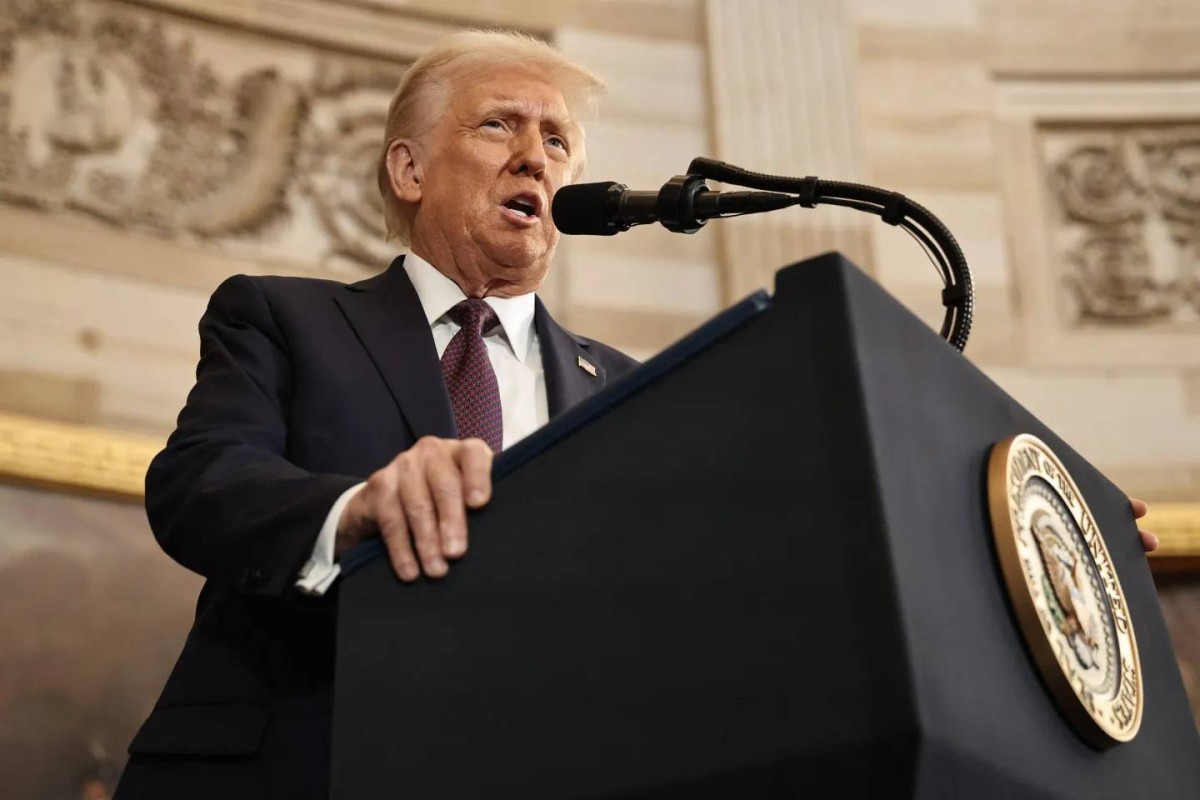Trump's Bold Moves at Davos Stir Global Reactions
As Donald Trump addresses the World Economic Forum, leaders and business titans across the globe react to his controversial statements. Discover the global impact of his second term's agenda.
Published January 24, 2025 - 00:01am

Image recovered from albayan.ae
Only three days into his second term as the President of the United States, Donald Trump virtually addressed the prestigious World Economic Forum in Davos. His speech was eagerly anticipated, not only because of his controversial policies but also due to the tumultuous nature of his administration's early decisions. The annual summit, held in the serene landscape of the Swiss Alps, became a vibrant hotspot for global political and economic discourse, as Trump's policies became a central subject for discussion among participants.
During his address, Trump did not mince words as he warned world leaders and business elites. He urged them to relocate their manufacturing to the United States or face substantial tariffs on their products. Trump boasted about his administration's plans to reduce taxes, unwind regulations on industries, and curb illegal immigration—policies that resonated with many business leaders in attendance. He presented the United States as a business-friendly environment with competitive tax rates, enticing companies to shift their production operations to American soil.
Trump's rhetoric on trade wasn't limited to encouragement; it also carried a stern warning. He reinforced his vision with a message: manufacture in America for lower taxes or risk higher tariffs, a prospect daunting enough to push corporate giants into considering relocation. This instigated mixed reactions from the audience, composed of influential figures including the CEO of Bank of America, Brian Moynihan, and renowned investors, many of whom stood captivated by Trump's resolute presentation.
In his wide-ranging speech, Trump linked oil prices to the ongoing conflict in Ukraine, calling on Saudi Arabia and the Organization of the Petroleum Exporting Countries (OPEC) to reduce oil prices to facilitate the cessation of hostilities. While these assertions drew applause from some, they also raised eyebrows, pointing to the complex interplay of energy and geopolitical interests that continue to shape global diplomacy.
Throughout the week, Trump's influence was omnipresent in Davos conversations, whether in formal discussions or casual exchanges. His policy decisions, including threats of tariffs against countries like China, the European Union, and Mexico, along with critiques of the Paris Agreement, were fodder for debates regarding economic protectionism and international cooperation.
The reaction from the international community showed a spectrum of responses. Without explicitly naming Trump, China's Vice Premier Ding Xuexiang cautioned against the risks of escalating trade conflicts, suggesting no one would emerge victorious from such commercial wars. Meanwhile, Germany's Chancellor Olaf Scholz reiterated his country's commitment to free trade and diplomatic discourse, signaling potential engagements with Trump's administration despite policy differences.
European Commission President Ursula von der Leyen underscored the EU's readiness to negotiate, albeit with adherence to the Paris climate commitments being a point of divergence from Trump's stance. Panama's President José Raoul Molino rebuffed Trump's remarks about reclaiming the Panama Canal, emphasizing Panama's focus on its own stability and control over the vital maritime route.
The forum also witnessed the voices of Trump's admirers. Argentine President Javier Milei, a staunch supporter, declared renewed hope that Trump's influence would usher in an era of freedom globally, countering the rise of what he termed an oppressive 'woke' ideology. This sentiment was echoed by tech billionaire and Trump enthusiast Marc Benioff, who expressed optimism about the economic opportunities presented by Trump's vision.
However, not all were seduced by Trump's seemingly simplistic solutions. Leaders like World Trade Organization Director-General Ngozi Okonjo-Iweala advocated for caution, reminding attendees of the catastrophic consequences of retaliatory tariffs on global commerce. Her call for calm and measured discussion highlighted the forum's role as a platform for multilateral solutions amid unilateral posturing.
Amid the clamor and contesting positions, one thing was clear—Trump's presence, even virtual, was a potent force capable of rallying allies, provoking opponents, and setting the agenda at Davos. As the world navigates these challenging times, the conversations sparked here will inevitably ripple through international spheres, influencing policy directions and the global economy for years to come.








